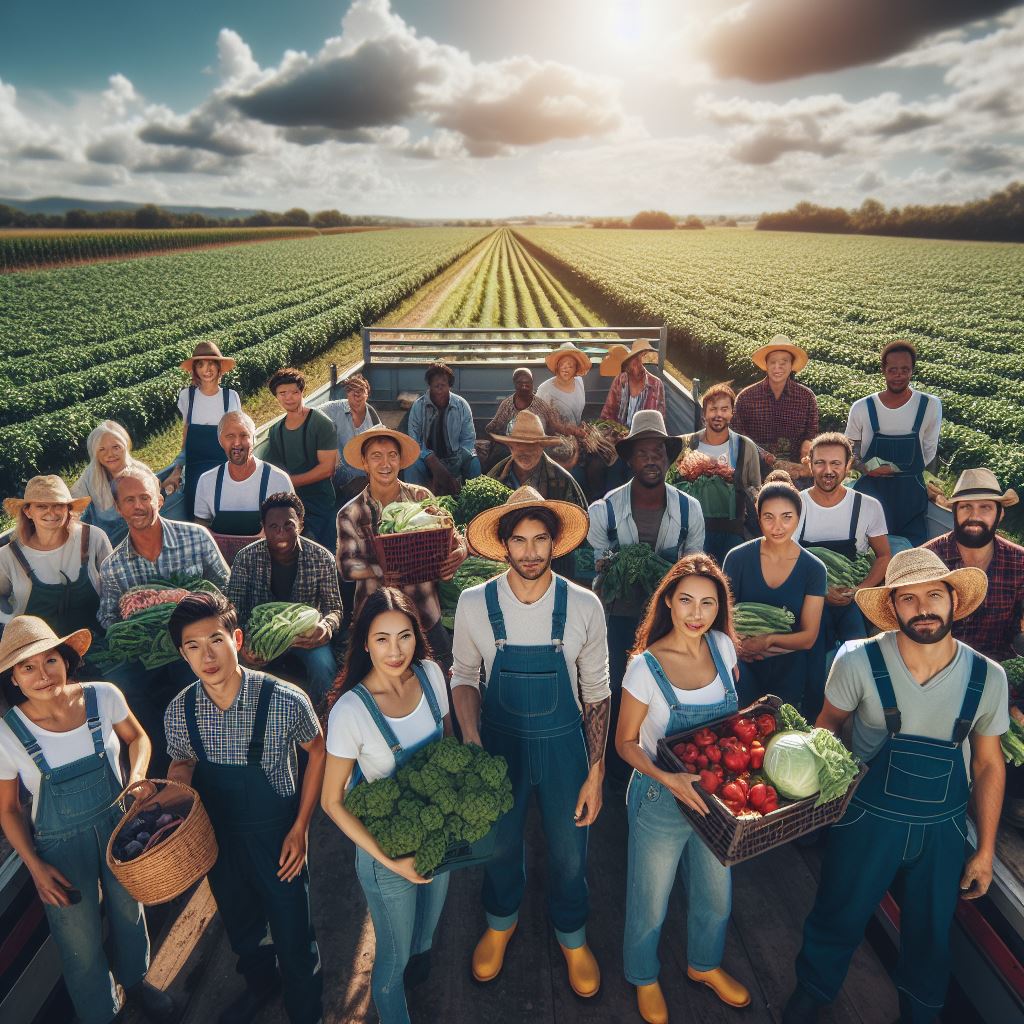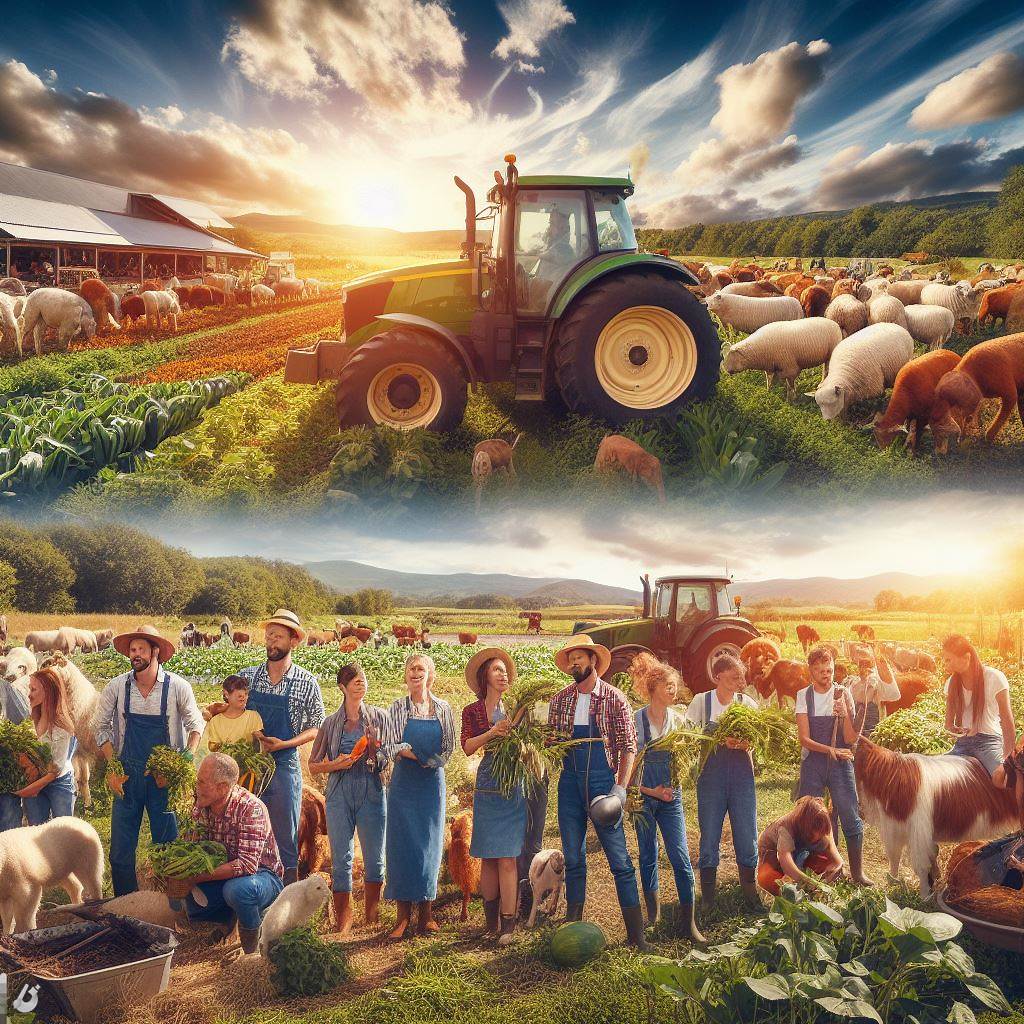Introduction
Farmers markets are local venues where farmers directly sell their produce to consumers.
They offer fresh, seasonal fruits, vegetables, and other farm products at competitive prices.
These markets serve as a vital link between farmers and urban communities, promoting sustainable agriculture.
By buying directly from farmers, consumers can support local food systems and reduce environmental impact.
Furthermore, farmers markets provide an opportunity for consumers to connect with food producers.
This connection fosters transparency, allowing consumers to learn about farming practices and ask questions.
Farmers markets also promote healthy eating by offering a wide variety of fresh, nutritious foods.
Unlike supermarkets, farmers markets prioritize quality over quantity, ensuring the freshest produce for customers.
In addition to fresh produce, farmers markets often feature artisanal foods, handmade crafts, and live entertainment.
These markets become community hubs, fostering a sense of belonging and supporting local businesses.
Furthermore, farmers markets contribute to the local economy by creating jobs and preserving farmland.
In short, farmers markets are not just places to buy groceries but also important community assets.
Benefits of Farmers Markets
Access to fresh and locally grown produce
Farmers markets offer a wide variety of fresh fruits, vegetables, and other foods that are locally sourced.
By shopping at farmers markets, you can ensure you’re getting the freshest, in-season produce available.
This means that the fruits and vegetables you purchase are not only tastier, but also more nutritious.
Transform Your Agribusiness
Unlock your farm's potential with expert advice tailored to your needs. Get actionable steps that drive real results.
Get StartedEnvironmental advantages (reduced transportation, packaging)
When you buy produce from farmers markets, you’re supporting a more sustainable food system.
Since the food is grown and sold locally, there is a significant reduction in transportation, which leads to lower carbon emissions.
Additionally, farmers markets often use less packaging than grocery stores, which helps to minimize waste.
Support for local economies and small-scale farmers
When you shop at farmers markets, you are directly supporting local farmers and their families.
These small-scale farmers work hard to produce high-quality food and rely on the income they make from selling at farmers markets.
By supporting them, you are helping to boost the local economy and ensure the viability of small farms.
Promotion of healthy eating habits
Farmers markets not only provide access to fresh produce but also encourage healthier eating habits.
By purchasing fruits and vegetables directly from farmers, you are more likely to incorporate them into your diet.
Additionally, farmers markets often offer a variety of organic and pesticide-free options that are beneficial for your health.
Community engagement and social interactions
Farmers markets serve as a gathering place for the community.
They offer a unique opportunity for people to come together, socialize, and build connections.
You can meet and interact with local farmers, artisans, and other community members, fostering a sense of belonging and strengthening community ties.
Farmers markets provide a platform for educational activities and workshops.
Many markets organize cooking demonstrations, gardening workshops, and classes on sustainable farming practices.
These opportunities allow consumers to learn more about where their food comes from and how it is produced.
Farmers markets often feature local crafts, homemade products, and specialty items.
From handmade soaps to artisan bread, there is a wide range of products available at farmers markets.
By purchasing these unique items, you are supporting local artisans and promoting local entrepreneurship.
Farmers markets can help build resilience in the community.
By fostering relationships between consumers and farmers, they create a more sustainable food system that is less dependent on large-scale industrial agriculture.
This can enhance food security and reduce the vulnerability of a community to external shocks.
Farmers markets contribute to the preservation of agricultural land and biodiversity.
By providing economic incentives for small-scale farmers, they help protect farmland from being converted into non-agricultural uses.
Additionally, farmers who sell at markets often prioritize growing a diverse range of crops, which promotes biodiversity and protects local ecosystems.
Showcase Your Farming Business
Publish your professional farming services profile on our blog for a one-time fee of $200 and reach a dedicated audience of farmers and agribusiness owners.
Publish Your ProfileIn essence, farmers markets offer numerous benefits, from providing access to fresh, locally grown produce to supporting the local economy and fostering community engagement.
By shopping at farmers markets, you can enjoy the advantages of fresh, nutritious food while contributing to a more sustainable and resilient food system.
Read: Sustainable Practices in Farm-to-Table
Understanding Farmers Markets
Farmers markets are community gathering spaces that provide consumers with access to fresh and locally sourced food.
Different types of vendors and products available
Farmers markets offer a wide variety of vendors, including farmers, artisanal food producers, and local crafters.
They sell fresh seasonal produce, baked goods, meats, eggs, dairy products, and much more.
Variations in pricing and quality
Prices at farmers markets can vary depending on factors such as location, growing practices, and product demand.
However, the quality of the products is generally high due to the direct relationship between growers and consumers.
Importance of organic, sustainable, and non-GMO labels
Many farmers markets prioritize offering organic, sustainable, and non-GMO products.
These labels indicate that the food is grown without synthetic chemicals, in an environmentally friendly manner, and without genetic modification, respectively.
Seasonality and availability of specific crops
One of the unique aspects of farmers market is the emphasis on seasonality.
Farmers bring crops harvested at their peak, ensuring optimal flavor and nutrition.
This means certain produce may only be available during specific months.
Benefits of shopping at farmers markets
Shopping at farmers market has numerous benefits.
Firstly, it supports local farmers and strengthens the local economy.
Additionally, it promotes sustainable agriculture practices and reduces the carbon footprint associated with long-distance food transportation.
Freshness and taste advantage
Produce found at farmers market is often harvested within a day or two of being sold.
This freshness leads to enhanced flavors and nutritional value, as fruits and vegetables are allowed to fully ripen before being picked.
Opportunity to connect with farmers and artisans
Farmers market provide an opportunity to directly interact with the people who produce your food.
You can ask questions about growing methods, recipes, or even get gardening tips from experienced growers.
Access to unique and heirloom varieties
Farmers markets often have a wider selection of unique and heirloom varieties of fruits and vegetables that might not be available in mainstream grocery stores.
This allows customers to try new flavors and support biodiversity.
Community and social engagement
Farmers market foster a sense of community and social engagement.
They create a space for people to gather, meet their neighbors, and establish relationships based on a shared love for fresh, local food.
Support for sustainable and ethical farming practices
By choosing to shop at farmers market, consumers support small-scale farmers who often use sustainable and ethical farming practices.
This promotes biodiversity, reduces water and soil pollution, and protects wildlife habitats.
Contribution to food security and resilience
Farmers market contribute to food security and resilience by providing an alternative to the industrial food system.
They ensure that communities have access to fresh and nutritious food, especially in times of crisis or disruptions in the supply chain.
Farmers market play a crucial role as local food hubs, connecting farmer and consumers, supporting sustainable agriculture, and providing access to fresh, healthy, and diverse food options.
They offer a unique shopping experience that benefits individuals, communities, and the environment.
Read: Farm-to-Fork: Understanding the Chain
How to Make the Most of Your Farmers Market Experience
Planning ahead: knowing the market schedule and location
- Research the farmers market schedule and locate the nearest market to plan your visit.
- Check if the market is open all year round or only during specific seasons.
- Make note of the market’s opening and closing times to ensure you don’t miss out.
Creating a shopping list based on seasonal produce
- Research what types of fruits, vegetables, and other products are in season.
- Create a list of items you need or want to buy based on the available seasonal produce.
- This ensures you purchase the freshest and most flavorful ingredients for your meals.
Exploring new and unique food options
- Farmers market often offer a wide variety of unique and specialty food items.
- Take the opportunity to explore and try new foods that may not be available in regular grocery stores.
- Engage with vendors to learn about their products and recommendations for preparing them.
Engaging with vendors and asking questions about their products
- Don’t be afraid to strike up conversations with vendors, they are often passionate about their products.
- Ask questions about farming practices, product origins, and any unique qualities of their offerings.
- Building relationships with vendors can enhance your overall farmers market experience.
Using cash or reusable bags to support sustainability efforts
- Bring cash with you to the farmers market as some vendors may not accept credit or debit cards.
- Use reusable bags or baskets to carry your purchases, reducing plastic waste.
- Supporting sustainability efforts demonstrates your commitment to the environment and local agriculture.
Visiting farmers market offers a unique experience not found in traditional grocery stores.
By planning ahead, creating a shopping list, exploring new food options, engaging with vendors, and supporting sustainability efforts, you can make the most of your farmers market experience.
Enjoy the fresh, seasonal produce and connect with local farmers and food producers in your community.
Read: Seasonal Eats: What Farm-to-Table Offers

Supporting Local Farmers Markets
Supporting local farmers markets is not only a great way to access fresh, locally grown food, but it also helps to strengthen the community and local economy.
Joining community-supported agriculture (CSA) programs
By joining a community-supported agriculture program, you can directly support local farmers and receive a bountiful share of seasonal produce.
- CSA programs allow you to connect with the farmers who grow your food.
- You can enjoy a variety of fruits, vegetables, and even meat and dairy products directly from local farms.
- Joining a CSA program ensures that local farmers have a stable market for their products.
- CSA shares often include lesser-known or heirloom varieties that you wouldn’t find in a regular grocery store.
- By participating in CSA programs, you can reduce the environmental impact of food transportation and packaging.
Encouraging friends and family to visit farmers markets
Spreading the word about local farmers market is essential in creating a vibrant community food hub.
- Invite your friends and family to visit farmers market with you to discover the abundance of fresh, local produce.
- Explain the benefits of supporting local farmers, such as reducing food miles and supporting sustainable farming practices.
- Organize group outings to farmers markets, where everyone can explore and support local vendors together.
- Show your loved ones how farmers markets offer a unique shopping experience with friendly vendors and a diverse range of products.
Sharing experiences on social media platforms
Social media platforms provide a powerful tool for spreading the word and promoting local farmers markets.
- Share your farmers market experiences through captivating photos and positive reviews on platforms like Instagram, Facebook, and Twitter.
- Use relevant hashtags to reach a wider audience and connect with like-minded individuals who appreciate local food.
- Tag and promote the farmers and vendors you encounter, helping to boost their visibility and customer base.
- Collaborate with local influencers or food bloggers to create engaging content about farmers markets and their benefits.
Participating in local events and supporting market initiatives
Local farmers markets often organize events and initiatives to engage the community and create a sense of togetherness.
Showcase Your Farming Business
Publish your professional farming services profile on our blog for a one-time fee of $200 and reach a dedicated audience of farmers and agribusiness owners.
Publish Your Profile- Attend farmers market events such as cooking demonstrations, workshops, or live music performances.
- Show your support by purchasing products from special market initiatives like fundraisers or seasonal promotions.
- Take part in community activities organized by farmers market, such as food drives or educational programs for children.
- Provide feedback and suggestions to market organizers to enhance the overall experience for both vendors and customers.
Volunteering or becoming a vendor at the farmers market
Volunteering your time or becoming a vendor at the farmers market takes your support to another level.
- Offer your skills by volunteering at the market, whether it’s helping with set-up, organizing events, or promoting the market.
- Become a vendor yourself and sell your homemade or locally sourced products, contributing to the market’s diversity.
- Engage with other vendors and customers, fostering relationships and further strengthening the community.
- Not only will you be supporting local farmers, but you’ll also have the opportunity to showcase your talents.
Supporting farmers market is not just about the food.
It’s about creating a sense of community, supporting sustainable practices, and promoting local businesses.
Get involved today!
Read: Eating Local: Benefits for You and Farmers
Conclusion
Farmers markets serve as valuable food hubs that offer numerous benefits.
They provide fresh, locally grown produce, promoting healthy eating habits and supporting local farmers.
Shopping at farmers market also helps reduce our carbon footprint by cutting down on food transportation.
Furthermore, these markets create a sense of community, connecting consumers with the people who grow their food.
We should encourage everyone to explore and support their local farmers markets.
By doing so, we not only access high-quality, nutritious food but also contribute to the sustainability of our communities.
It is important to recognize farmers market as vital pillars of our food system, fostering a healthier and more sustainable future.
So let’s embrace the farmers market culture and take advantage of all the benefits they offer!




